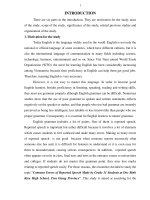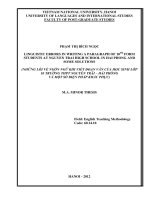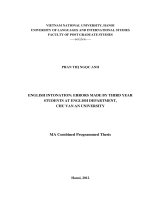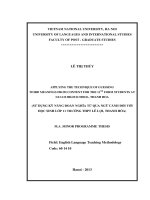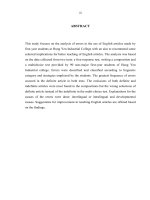Possible causes of common English written errors made by 12th- form students at Thanh Ha High School, Hai Duong and some possible solutions
Bạn đang xem bản rút gọn của tài liệu. Xem và tải ngay bản đầy đủ của tài liệu tại đây (182.66 KB, 6 trang )
Possible causes of common English written
errors made by 12th- form students at Thanh Ha
High School, Hai Duong and some possible
solutions
Nguyễn Thị Hương
Trường Đại học Ngoại ngữ
Luận văn ThS. Chuyên ngành: English Methodology; Mã số: 60 14 10
Người hướng dẫn: Nguyễn Thị Thơm Thơm, MA.
Năm bảo vệ: 2011
Abstract: This minor thesis was carried out with an attempt to improve the teaching and
learning of writing skill of the teachers and the 12th form students at Thanh Ha High
School, Hai Duong province. The purposes of the thesis were to investigate the types of
errors that 12th form students at Thanh Ha High School often make in learning English,
possible causes of common English written errors made by 12th form students and to
offer some possible solutions to overcome these common English written errors. The
subjects involved in the study were 130 students' actual writings in class and 8 teachers
who are currently teaching and have taught writing skill before. Teachers were invited to
answer the survey questionnaire and to participate in the interview. The study reveals that
in lexical and grammatical errors, students often commit errors in spelling, noun number,
word choice/ wrong word, wrong conjunction/ connective, article and verb form
mistakes. The common causes for these kinds of errors are mainly their carelessness,
mother tongue interference, incomplete application of rules, overgeneralization and
ignorance of rule restrictions. The study suggests that teacher should use some techniques
in pre-writing stage and post- writing stage to reduce and prevent students' written
common errors . In pre-writing stage, teacher can elicit students' vocabulary and
structures, give students samples of the topic which students are required to write, and
sometimes teach them grammar rules. In post-writing stage, teachers can ask student to
correct themselves, then correct in pairs and finally teachers give corrective feedback.
Keywords: Phương pháp giảng dạy; Lỗi; Học sinh; Lớp 12; Trung học phổ thông Thanh
Hà
PART A: INTRODUCTION
1. Background to the study
English has become one of the most popular languages in the world. As an effective
means of international communication, it is used as the official language in many fields of life
such as economics, politics, science, technology, sports and many others. Therefore, there is a
great demand for teaching and learning English throughout the world. There are more and more
people who learn English and consider it an inevitable factor in their work and life.
In Vietnam, English has been brought into the school curriculum as a compulsory
subject, and the teaching and learning of the international language has been recently paid great
attention to. When teaching English, the teacher teaches his learners not only the English
language but also its usage. It means that his aim is to train learners with a good control of
English skills and to teach them to put the language into use in real communicative situations:
either writing or speaking. This learners' competence is assessed in terms of how comprehensibly
and accurately a message is conveyed. If a message is unsuccessfully conveyed, the teacher will
consider the reason why it is so, and the answer often is the means that causes it. What lessens
the effectiveness may be that there are something wrong with the meanings of the sentences i.e.
what is usually called 'error' in foreign language learning.
In effect, learners often make mistakes when they produce English. When teachers find
the learners' errors, they often give feedback by correcting or just pointing them. However, this is
sometimes not effective because learners still make the same errors the next time. Like many
teachers and researchers, Vietnamese teachers have been always seeking for new and effective
methods and techniques to improve their teaching with the hope of predicting and preventing
errors before they appear. Nevertheless, they pay much more concern to why Vietnamese
learners commit errors and how to prevent or reduce these errors, not students at high schools.
Therefore, the situation encouraged the author to do the research on "Possible causes of common
English written errors made by 12th- form students at Thanh Ha High School, Hai Duong and
some possible solutions". This study will be really useful for both teachers and students in
teaching and learning writing skill.
2. Aims of the study
The researcher defines the major objectives of the study as:
to investigate the types of written errors that 12th-form students at Thanh Ha High
School often make in learning English.
to investigate possible causes of common English written errors made by 12th-
form students.
to offer some possible solutions to overcome these common English written
errors.
This study is carried out with the hope that teachers can improve their writing teaching
methods and students can define their common errors and adjust their way of learning this skill
to obtain better results.
3. Research questions
In order to achieve the above aims, three research questions are raised:
3.1. What are the types of written errors that 12th- form students make in writing skills?
3.2. What are the major causes of these errors?
3.3. What recommendations should be given to reduce and prevent these errors?
4. Methods of the study
With the aim of finding out the causes of common written errors made by 12th-form
students at Thanh Ha High School, Hai Duong, this study adopts quantitative and qualitative
methods.
To identify the problems, the study has been carried out with the data collected from
different instruments:
- Consulting related materials: For the sake of getting knowledge and useful ideas,
I read many books and other materials in addition to earlier researchers about errors and causes
of common English written errors.
- Delivering survey questionnaire: To fulfill this thesis, one survey questionnaire
for teachers was carried out to find out the teachers' attitudes toward causes of common English
written errors and some possible solutions.
- Interviewing teachers who have been teaching writing to 12th form students to
investigate what and how they do to prevent and reduce students' common written errors.
- Using students' actual writings as a technique of eliciting data for the analysis
and statistical counting as measurement of results
5. Scope of the study
This study is limited to the area of teaching and learning writing in 12th-form at Thanh
Ha High School, Hai Duong. Specifically, this minor thesis deals with the possible causes of
common English written errors made by 12th- form students, and based on these discussions of
the findings, some possible solutions will be introduced.
6. Organization of the thesis
The thesis has three main parts: introduction, development and conclusion.
The introduction presents the background to the study, aims and significance of the
study, research questions, methods, scope and organization of the thesis.
The development consists of two chapters. Chapter One exposes literature review relating
writing and causes of errors in foreign learning. Chapter Two is about the study which
investigates possible causes of common English written made by 12th- form students at Thanh
Ha High School from survey questionnaires on teachers and students' actual writings. It also
contains findings of the study and some solutions for the problems.
The conclusion gives a summary of what has been discussed so far in the thesis, the
limitation of the study, and suggestion for further research.
REFERENCES
Tiếng Anh
1. Brannon, L, Knight.M, and Neverow-Turk, V (1982). Writers Writing. Heinemann
Portsmouth, NH: Boynton/ Cook Publishers
2. Byrne, D, (1991), Teaching Writing Skill, Longman handbooks for language teachers,
Longman, London
3. Chomsky, N. Aspects of the Theory of Syntax. Cambridge, MA: M.I.T press. 1965
4. Corder, S.Pit. 'Error analysis'. Papers in Applied Linguistics. Vol.5 London: OUP, 1975
5. Dulay, H.C., Burt, M.K. and Krashen, S.D. Language Two. Oxford: OUP, 1982
6. Duskova, L. 'On sources of errors in foreign language learning'. IRAL. Vol.7, No.1 published
by Julius Groos Verlag, Heidelberg. Feb. 1969.
7. Edge, J. (1989) Mistake and correction. New York: Longman. Retrieved June 20, 2011 from
the web
8. Etherton, A.R.B. 'Error analysis: problems and procedures'. English Language Teaching
Journal. Vol. 32, No.1, Oct 1977.
9. Geogre, H.V. Common Errors in Language Learning. Rowley, Mass: Newbury House, 1972.
10. Jacobovits, Leon A. A Spycholinguistic Analysis of Second Language Learning and
Bilingualism. Illinois. 1969.
11. Lado, R. Linguistics Across Cultures. University of Michigan Press, 1957.
12. Lannon, J. M (1989), The Writing Process: A Concise Rhetoric, Southeastern Massachusetts
University.
13. Norrish, J. Language Learners and Their Errors. Mc Milan Publisher Ltd. 1983
14. Nunan, D (1991), Language Teaching Methodology, Prentice Hall International Ltd, Great
Britain.
15. Raimes, A (1983), Techniques in Teaching Writing, OUP.
16. Richards, J.C.& Sampson, G.P. The study of learner English'. Error Analysis: Perspectives
on Second language Acquisition. Longman, 1974.
17. Richards, J.C. 'A non-contrastive approach to error analysis'. English Language Teaching.
Vol.25. No.3. OUP.1971
18. Richards, J.C.; Platt, J. and Platt, H. Longman Dictionary of Language Teaching and Applied
Linguistics. Longman Group UK Limited. 1992
19. Rivers, W. M (1981), Teaching Foreign Language Skills (2nd ed.), The University of
Chicago Press, Chicago.
20. Tribble, C (1996), Writing, Oxford University Press, Oxford
21. White, R.V (1981), Approaches to Writing. Guidelines for Writing Activities, A Magazine for
Language Teachers, RELC.
Tiếng Việt
1. Trang, Nguyen Bao (2008), Luyện kĩ năng viết Tiếng Anh trung học phổ thông, Nhà xuất bản
Đại học Quốc Gia Hà Nội, Hà Nội.
2. Ái Thanh, Trần Thị (2009), Những bài viết mẫu Tiếng Anh Trung Học Phổ Thông, Nhà xuất
bản Đại học Quốc Gia Hà Nội, Hà Nội.


